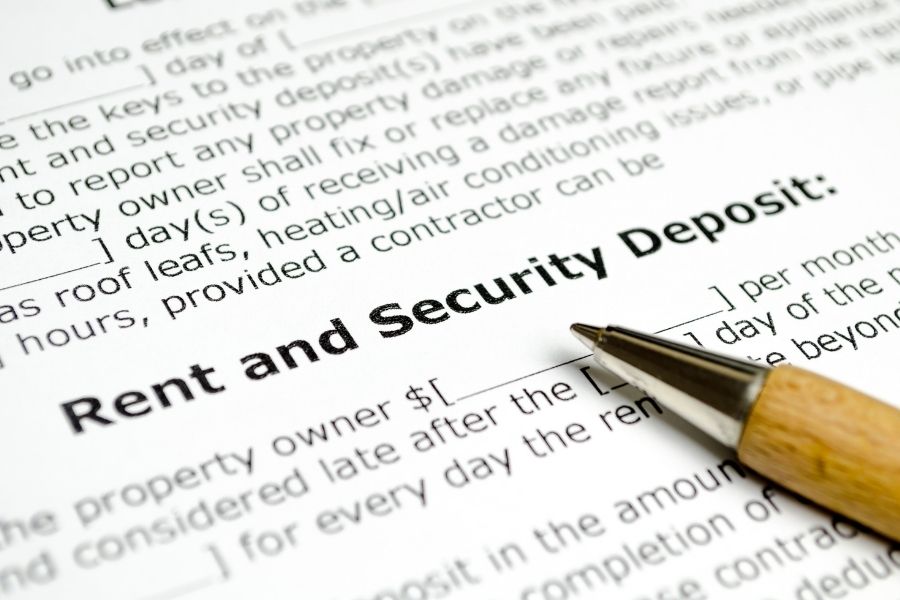
Photo from Canva
In this article:
If you’re like most military renters, after you find the perfect rental, you know that you need to pay your landlord a security deposit in addition to at least the first month’s rent before moving in. But you probably don’t think about how your landlord handles the check after it’s cashed. In fact, you probably don’t even remember the security deposit until it's time to move out. And, you definitely don’t consider how the landlord/tenant laws in your state affect everything about the security deposit.
From now on, you should, because your inactivity or ignorance could cost your deposit or at least make it harder to get it back. Before signing a rental agreement in any state, but especially in heavily populated military states, read over your lease and understand these points that detail your security deposit.
What to Understand About Security Deposits
1. Most states and local governments have laws about how much a landlord can charge for a security deposit. However, some states and local entities do not.
2. Your landlord has to follow your state’s law regarding the amount of time they have to return your security deposit.
3. Your security deposit might accrue interest. If it does, most states require your landlord to let you know.
For more information, read What Renters Should Understand About Security Deposits.
We’ve rounded up general information about security deposits in popular military states to give you a heads up. But, you shouldn’t use this information as legal advice. Instead, consult a real estate attorney or legal help at your closest military installation if you have specific questions.
See California Civil Code sections 1950.5 and 1940.5(g)
How much can the landlord charge for the security deposit?
The landlord can charge tenants two months’ rent if the house is unfurnished and three months’ rent if it’s furnished. However, the landlord can only charge active duty servicemembers for one month's rent for an unfurnished rental and two months' rent for a furnished rental.
When does the landlord have to return your security deposit?
After you’ve turned in the keys in California, the landlord has 21 days to return the deposit, plus an itemized statement of deductions.
What else should I know?
Your landlord has to give you advanced notice before deducting money from your security deposit for repairs.
Learn more: 7 Things to Know Before Renting Your First Home.
See Florida Statutes Annotated sections 83.49 and 83.43(12).
How much can the landlord charge for the security deposit?
Florida is a state that does not limit the landlord charging a security deposit. It defers to local city or county governments.
When does the landlord have to return your security deposit?
After vacating and turning in the keys, the landlord has 15 to 60 days to return your deposit. The wide date range reflects the chance for the tenant to dispute any deductions taken from the deposits. Your landlord has to give you advance notice of the deductions.
What else should I know?
In Florida, your landlord has 30 days after receiving the security deposit to let you know whether or not they’ll put the money into an interest or non-interest bearing account. They also should share the account's name, the interest rate, and the date of interest payments. If the account accrues interest payments, you should receive them annually and at the end of the lease unless you end the lease illegally before the term ends.
Ready to move in? Here are 6 Tips for Being a Tenant that Landlords Love.
See North Carolina General Statutes sections 42-50 to 42-56.
How much can the landlord charge for the security deposit?
In North Carolina, landlords can charge you two months’ rent if the lease is longer than two months. Or, they’ll require one and one-half months' rent for a month-to-month rental agreement.
When does the landlord have to return your security deposit?
After you’ve moved, your landlord has 30 days to return your deposit, but if they need more time to get the itemization done (they may be waiting on repairs), then they have within 60 days of your vacancy.
What else should I know?
The state requires landlords to let you know within 30 days of the lease’s start date the name and address of the bank where your deposit sits.
back to top

Photo from Canva
See Texas Property Code Annotated §§ 92.101 to 92.110.
How much can the landlord charge for the security deposit?
Texas does not have a state law limiting the amount a landlord can charge you for a security deposit, but your city or county may. Therefore, you should research local laws restricting the amount and in addition to security deposit procedures.
When does the landlord have to return your security deposit?
In Texas, the landlord has 30 days to return your security deposit.
What else should I know?
You may have to give your landlord a notice of surrender to get your security deposit back. Note that this request must be included in the lease, and the words have to be underlined or bolded for easier reading.
First time renting a home? Learn How to Be an Amazing Tenant.
See Virginia Code Annotated §§ 55.1-120455.1-1206, 55.1-1208, and 55.1-1226.
How much can the landlord charge for the security deposit?
Your landlord cannot charge more than two months’ rent. The landlord can also ask you to buy damage insurance coverage (or a combination of insurance and a deposit) in an amount no greater than two months' rent.
When does the landlord have to return your security deposit?
The landlord has 45 days after you have moved out to return your deposit. You have the right to walk through the final inspection to get an idea of damages, but in Virginia, the landlord doesn’t have to give you advanced notice about how the deductions they’ll take for damages.
What else should I know?
If your landlord deducts from your deposit while living in the house, they have 30 days to itemize the deductions and turn them over to you. The number jumps to 45 days if the amount is more than your security deposit.
See Washington Revised Code Annotated § § 59.18.260 to 59.18.285.
How much can the landlord charge for the security deposit?
Washington state does not restrict security deposits, but your local city or county could. The state does, however, regulate how the deposit is collected. You might have the chance to pay your deposit and non-refundable fees in three equal and consecutive installments if your lease is three months or longer (unless your total is less than 25% of your monthly rent or if they haven’t asked for the last month’s rent). You and the landlord are required to sign installment schedules.
When does the landlord have to return your security deposit?
Your landlord must return the security deposit within 21 days after you’ve moved out.
What else should I know?
There are several other things to know about security deposits in Washington. Your landlord must disclose in your lease the ‘how’ and ‘where’ details of your security deposit, including which parts of the deposit are withheld and the bank’s address. They also have to notify you if the facts change.
Before your landlord can collect a security deposit, they must provide a written statement or checklist confirming the state of the house (cleanliness, damage) when you take over.
The landlord is required to give you a receipt for the security deposit.
In the past, you might have thought the only security deposit detail you needed to worry about was the amount due to sign the lease. Now, you know to come to the signing table prepared and ready to ask your landlord questions about their terms and if they meet state and local laws.
By Dawn M. Smith

).jpg)
back to top